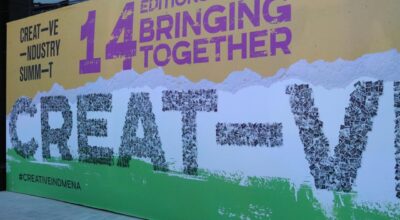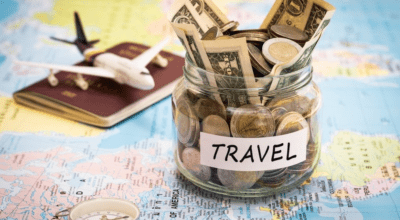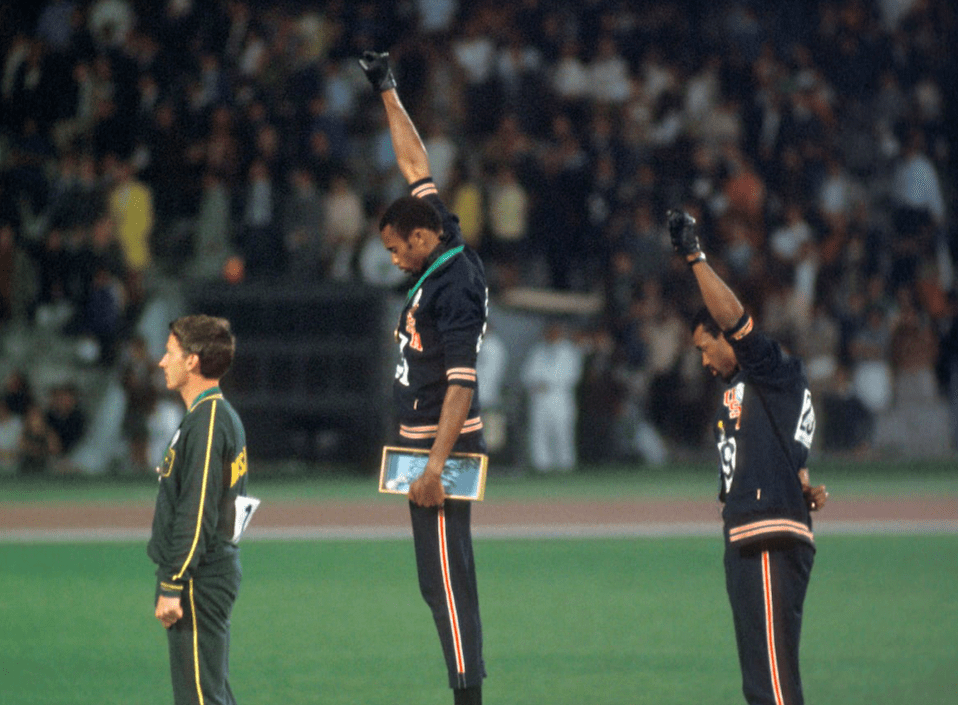Amongst others, Simone Biles, Colin Kaepernick, Naomi Osaka, and Marcus Rashford are harnessing their influence to instigate positive social change and redefining what it means to be an athlete.
Since I was young, I was led to believe that my disinterest in watching sports on television was solely because I’m a girl. This was disproved when I met my best friend at college. Her love of televised sports made me realize that my aversion to it was individual and subjective, rather than a condition determined by my gender.
During football season, she would never miss a match. During the off-season, she would watch endless Youtube videos with titles like “Liverpool’s Top 10 Goals!”
I couldn’t imagine anything more boring.
However, there’s definitely something different about this year. Although I didn’t feel any urge to actually watch UEFA EURO 2020, I was intrigued by its media coverage – especially following the tournament’s conclusion.
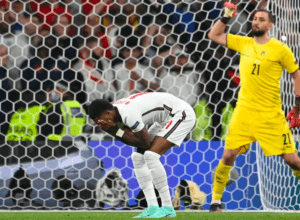
England lost the final to Italy during a penalty shootout. Photo Via: POOL/AFP Getty Images
For those of you unaware, Italy won the final during a tense penalty shootout. In a truly disappointing response, members of the defeated England team that missed their penalties were subject to extreme racist abuse by ‘fans’ who targetted the young black athletes both on social media, and through street vandalism.
Thankfully, these horrific incidents finally forced the British government to acknowledge the severity of the long and shameful history of racism amongst sporting fans not only in England but throughout Europe. The United Kingdom, therefore, implemented a policy banning ‘fans’ with a history of online racist abuse from attending sporting events. Moreover, there was an outpouring of support from the English public for the young men – both through social media and by covering up offensive graffiti racially abusing the footballers.
On social media, many defenders of the targetted footballers spoke about the athletes’ contributions to society beyond the pitch. For instance, Marcus Rashford, the Manchester United player whose mural was famously defaced following the match, was awarded an MBE – a prestigious award and accompanying title bestowed by the Queen of England – for his community efforts in 2020.

Manchester residents step in to cover up racist graffiti on Marcus Rashford’s mural with messages of support and admiration. Photo Via: Danny Lawson/PA Images via Getty Images
Although ideally, athletes such as Rashford wouldn’t have to cite their truly incredible work towards social change to save themselves from being treated in an inhumane and racist manner, it had got us thinking about activism in athletics that had previously been overlooked.
More recently, however, the media has begun to take notice.
For years, athletes have been aware of the audiences they attract, and therefore the influence they have on the community and the pressure to act as role models. Some of these athletes have risen to this challenge with grace and determination.
Today, we want to highlight and celebrate some of the social causes that athletes have furthered both on and off the pitch, and how their work has benefitted society.
Children Experiencing Food Insecurity and Poverty
Rashford, the Manchester United player, was awarded an MBE in 2020 for his work to end food insecurity for children.
This may seem surprising, given that the United Kingdom is largely considered one of the wealthiest nations in the world, and therefore we may assume that food poverty is not an issue. However, according to the Food Foundation, 10% of children were already living in “severe food insecurity,” before the pandemic. As the country began to suffer economic and employment consequences of Covid, the number of children going hungry rose to 20%. One in five children in the UK didn’t have enough to eat.
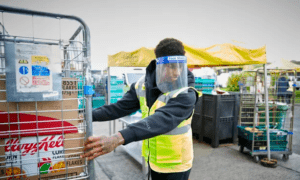
Rashford volunteering for school food distribution during Covid. Photo Via: Fareshare/Mark Waugh/PA Images
Having grown up in a food-insecure household himself, Rashford was extremely vocal about the government’s apparent lack of consideration for affected children during the pandemic. This began with the government’s failure to accommodate children who relied on free school meals for food when they began quarantine, and only continued when the summer holidays in 2020 began.
Politicians had initially announced that they had not planned to give food vouchers to families during the holidays. In response, Rashford called public attention to the issue by protesting on social media. According to the Guardian, when Prime Minister Johnson reversed the decision, he also announced the implementation of a new £120m “covid summer food fund” for 1.3 million pupils in England. Additionally, Johnson called Rashford personally to apologize for the oversight and to thank him for his advocacy.

Marcus Rashford (right) and Prime Minister of the UK Boris Johnson (left). Photo Via: Getty/Laurence Griffiths/WPA Pool
Since then, Rashford has collaborated with several major UK food brands to set up a “child food poverty task force.” This task force is dedicated to working with the government to sustainably and definitively solving food poverty in the UK.
Anti-Racism
In 2016, the American footballer Colin Kaepernick began a powerful symbolic protest. At the beginning of the match, as they played the national anthem, Kaepernick simply went down on one knee rather than stand. He stated:
“I am not going to stand up to show pride in a flag for a country that oppresses Black people and people of colour.“
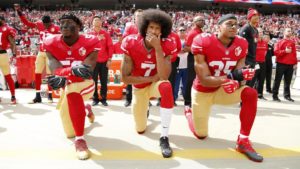
Colin Kaepernick ‘takes a knee’ during the national anthem in 2016. Photo Via: John G Mabanglo
Although this provoked outrage in some American communities, claiming Kaepernick was unpatriotic and disrespectful, his silent and powerful protest inspired both fellow athletes and their fans – not only in the US but around the world.
Perhaps most memorably, many protesters followed the movement during the global mass protests against racial inequality during the summer of 2020, in support of the Black Lives Matter movement.
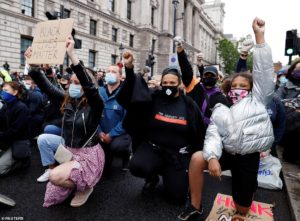
Protests for Black Lives Matter ‘take the knee’ around the world. Photo Via: Reuters
Moreover, the symbolic protest has again shown up amongst athletes in 2021’s most prolific sporting events.
The players of the English, Scottish, Irish and German teams took the knee during the UEFA Euros in 2021. This pattern has continued with the British and Chilean women’s football teams during the Tokyo Olympics.
Feminism and the Sexualisation of Women
Earlier this week, we posted about the German gymnastics team, who at the 2020 Tokyo Olympics swapped out their traditional leotards with ankle-length unitards. The women on the team said it had been their choice to adopt the new uniform, and were overwhelmed by the support of their coaches. According to CNN and several other major news outlets, they chose to change the uniform in a conscious attempt to combat the over-sexualization of the sport and its athletes.
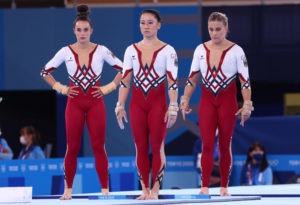
German gymnastics team at the Tokyo 2020 Olympics. Photo Via: Reuters
Moreover, the German team has spoken out in support of all women and the freedom of choice in deciding what to wear – be it more or less clothing. German gymnast Elena Seitz gave the powerful statement:
“It’s about what feels comfortable […] We wanted to show that every woman, everybody, should decide what to wear.”
In a similar vein, the Norwegian beach handball team has caused a similar stir with changes to their uniform at Handball EURO 2021. Instead of wearing ‘regulation’ bikini bottoms, they chose to wear biker shorts. In response – according to E Online – the European Handball Federation threatened the women with a fine of €150 per player, or €1,500 in total.

Norwegian Women’s beach handball team. Photo Via: Norwegian Handball Federation
This move called into question the necessity of ‘regulation’ clothing, as the women pointed out that male players are allowed shorts that fall just above the knee. Why, therefore, should the rules be different for women? What purpose does the wearing of bikini bottoms truly serve?
Rather, it seems that the rules only exist to police women’s choice of clothing – a debate that often reignites in Egypt during the summer, when many beaches and resorts refuse women the right to wear burkinis should they choose to.
Mental Health Advocacy
Two major female athletes this year have memorably brought mental health to the forefront of our attention: Naomi Osaka and Simone Biles.
The tennis star and highest-paid female athlete in the world, Osaka, sparked controversy this year following her decision to forfeit her place at the French Open. Before the tournament began, she had stated her intention to miss pre and post-match press conferences, agreeing in advance to pay any fines subsequently imposed. Osaka stated that since her rise to fame, she has suffered “long bouts of depression,” which had been exacerbated by media appearances. In response, there was an uproar on social media accusing Osaka of being ungrateful, and reminding her of the ‘obligation’ that athletes have towards their fans. These online comments led Osaka to leave the competition altogether.

Naomi Osaka. Photo Via: Alexandra Tarentino, Associated Press
As a result, there was a public outpouring of support – not only from fans but also from corporate sponsors such as Nike, Sweetgreen, and Mastercard. People praised Osaka for drawing boundaries and caring for herself rather than chasing another title.
Similarly, this week, the decorated American gymnast Simone Biles forfeited her place in the women’s gymnastics final at the Tokyo Olympics. After some surprisingly disappointing scores in the first rounds, Biles underwent “medical evaluations,” and announced her decision to withdraw shortly afterward.
Biles later clarified that her performance was not due to physical injury, but rather because she was “struggling with some things,” and she didn’t feel mentally equipped to finish the competition to her highest standard. She described concerns that she would, in fact, jeopardize the chances of the rest of her team if she continued:
“I knew that the girls would do an absolutely great job and I didn’t want to risk the team a medal […] because they’ve worked way too hard for that […] I’ll usually persevere and push through things, but not to cost the team a medal.”

Simone Biles at the Tokyo 2020 Olympics. Photo Via: AP Photos/Ashley Landis
Biles’s prioritization of herself and her teammates has caught global media attention. Once more, there has been an outpouring of public support and praise for the gymnast after what could have only been an extremely difficult decision.
Both Biles and Osaka have instigated crucial conversations about the recognition of our own limitations, the importance of drawing boundaries, and preserving our mental health.
There is still a long way to go
Although the actions of these athletes are admirable, it seems important to remember that they are responding to existing social issues that still require resolution. Although athletes have sparked conversations about mental health, feminism, racism, and social inequality, we are far from definitively solving these issues.
Whilst you enjoy watching the Olympics or any other sporting event this year, be aware of the emerging dimension of social justice and advocacy that has begun to enrich our viewer experience.
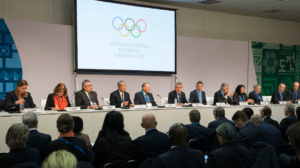
Photo Via: International Olympic Committee Website
In fact, according to USA Today, it is no accident that activism is more present during this Olympics. Shortly before Tokyo 2020 began, the International Olympics Committee revised “Rule 50,” which historically bans political demonstrations or protests from the games. This year, athletes are permitted to make political statements during media appearances and before the event itself – as long as they do not aim to harm or target a particular group of people. You can read the full revisions to the guidelines here.
We look forward to seeing more athletes use their influence and audience to instigate social change.
If it continues, I might actually begin to watch sports.



